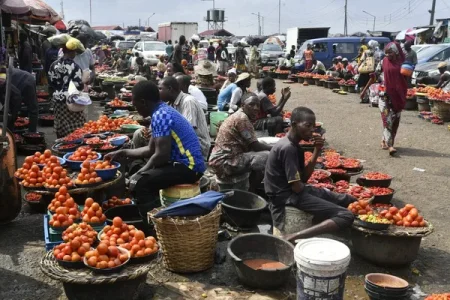
UN warns that 82 million Nigerians may face hunger by 2030 due to rising food prices, climate change, and agricultural challenges. Experts call for urgent government action, including farmer support and modernized farming practices. The crisis highlights the need for a comprehensive approach to ensure food security.
The United Nations has issued a stark warning about Nigeria's food security, predicting that up to 82 million people—nearly two-thirds of the country's population—could face hunger by 2030. This alarming forecast comes amid rising food prices and persistent challenges in the agricultural sector.
Nigeria's food inflation rate reached a record high of 40.66% in May 2024, according to the National Bureau of Statistics. This represents the most significant year-on-year increase in food prices since record-keeping began in 1996. The surge in food costs is putting immense pressure on Nigerian households, with many struggling to afford necessities.
Climate change is identified as a major contributor to the looming crisis. Agricultural experts highlight that smallholder farmers, who form the backbone of Nigeria's food production, are particularly vulnerable to changing weather patterns and lack the resources to adapt effectively. Irregular rainfall and inadequate irrigation systems further compound the problem.
The Nigerian government, in collaboration with international organizations, conducts annual food security surveys. Recent findings indicate that approximately 22 million Nigerians will face food insecurity in 2023, with the number expected to rise dramatically by 2030 if current trends continue.
Experts emphasize the need for urgent action to avert this crisis. Recommendations include increased government support for farmers through subsidies, improved access to technology, and enhanced irrigation systems. The integration of satellite-based crop monitoring is suggested as a means to provide real-time data on crop conditions, enabling better decision-making in agricultural practices.
The All Farmers Association of Nigeria echoes the UN's concerns, stating that the report reflects the real situation on the ground. They urge the government to take the warning seriously and implement measures to support farmers, particularly in promoting irrigation farming systems and off-season cultivation.
Critics argue that the government's approach to agriculture has been inadequate, with some describing it as "lackadaisical." They call for a more proactive stance in supporting farmers and modernizing agricultural practices across the country.
As Nigeria grapples with this impending food crisis, the need for a comprehensive, science-based approach to agriculture becomes increasingly apparent. Experts stress the importance of leveraging research, technology, and innovation to transform the agricultural sector and enhance food security for the nation's growing population.




